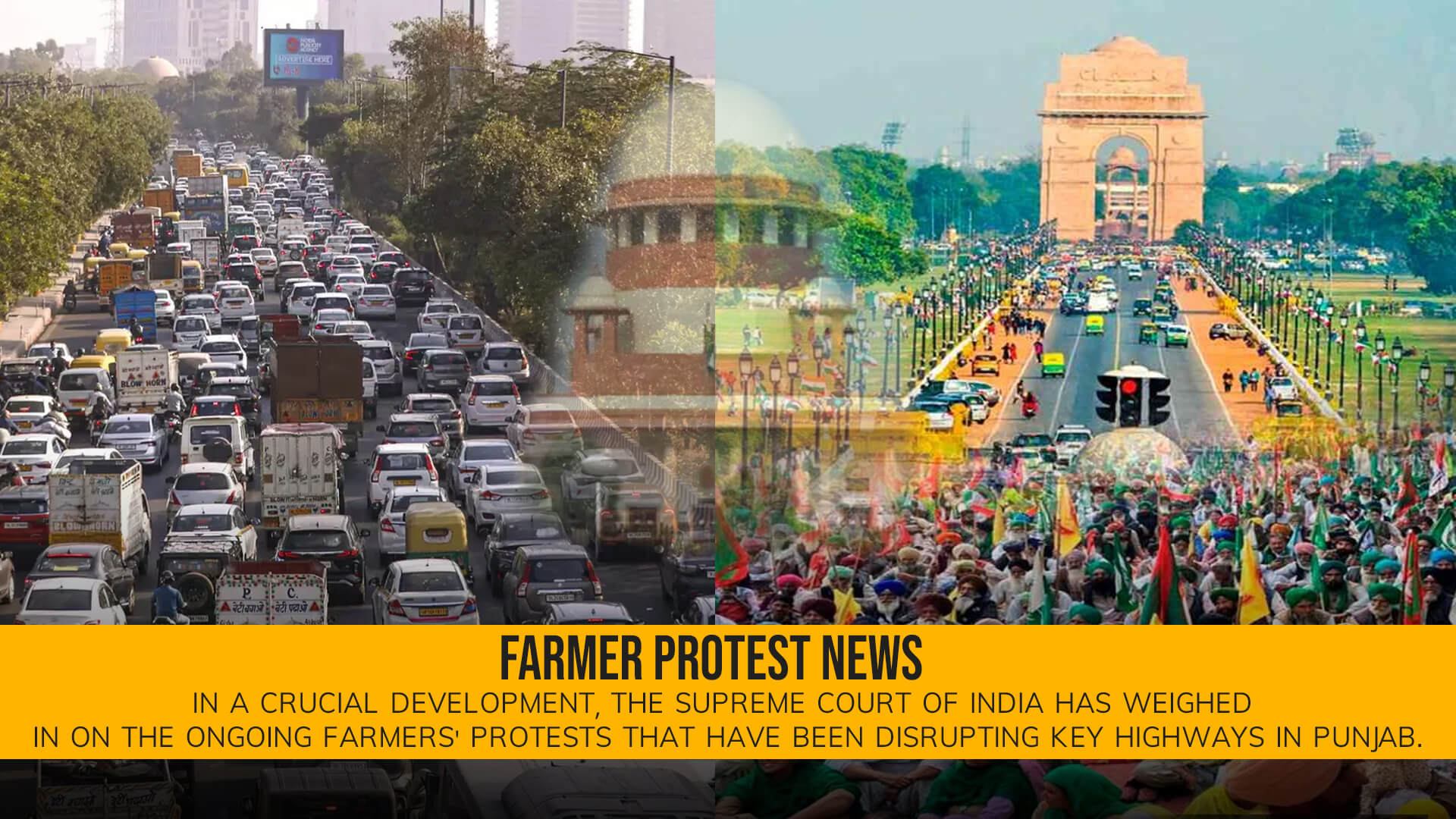Farmer Protest News Today
Farmer Protest News, New Delhi ( 09/12/2024 ): In a crucial development, the Supreme Court of India has weighed in on the ongoing farmers’ protests that have been disrupting key highways in Punjab. The court’s decision comes after a petition was filed seeking the removal of road blockages caused by the protestors. The farmers, who have been protesting against various agricultural policies, have expressed concerns that their grievances have not been adequately addressed by the government.
Supreme Court’s Stance on Public Order
The Supreme Court, while acknowledging the right to protest, has emphasized the importance of maintaining public order. It noted that while the farmers’ right to peaceful assembly is protected under the Constitution, there must also be a balance between the right to protest and the freedom of movement for other citizens. The court directed that the blockades, which have been ongoing for weeks, should not continue indefinitely and must be resolved in a manner that does not infringe on the rights of others.
Justice D.Y. Chandrachud, who was presiding over the matter, remarked that such blockades have serious implications for the functioning of daily life in Punjab and surrounding regions. He urged the farmers’ leaders to come to the table for talks with the state and central governments to reach a peaceful resolution. The case is being closely monitored, as it impacts not just the farmers’ movement but also the broader issue of civil disobedience and public protest in India.

Farmers’ Protest Background
The farmers’ protests in India, particularly in Punjab, have been ongoing for more than a year, largely stemming from opposition to the 2020 farm laws introduced by the government. These laws, which were designed to modernize India’s agricultural sector, were perceived by many farmers as being pro-corporate and against their interests. The protests have seen massive participation from rural areas, particularly in Punjab, Haryana, and Uttar Pradesh, with farmers demanding the repeal of these laws.
The government initially refused to repeal the laws, citing their potential to boost agricultural productivity and create a more market-oriented environment. However, the farmers remain unconvinced, arguing that the laws would lead to the exploitation of small farmers by large corporations and diminish the MSP (minimum support price) system. After months of intense protests, the government eventually agreed to repeal the laws in 2022, but the farmers’ demands have shifted towards seeking compensation for families of deceased protestors, as well as other demands related to the agricultural sector.
Impact of the Blockades on Public Life
The blockades, which have been centered around key highways in Punjab, have significantly disrupted normal life in the region. Commuters, transport services, and even essential supply chains have been severely impacted. The disruption has sparked frustration among the local population, who have expressed concern about the economic consequences of prolonged protests.
Additionally, these blockades have also affected neighboring states like Haryana, Uttar Pradesh, and Delhi, where agricultural produce and essential goods have been delayed, leading to shortages in some areas. Local businesses have complained about the economic repercussions of these protests, and citizens have voiced their dissatisfaction with the ongoing disruptions.

Legal and Social Implications of the Protests
The Supreme Court’s intervention underscores the increasing tension between civil rights and public order. While the right to protest is a fundamental freedom, it must be exercised in a way that does not harm public welfare. In this case, the farmers’ protest, despite being largely peaceful, has led to growing concerns about its broader impact on society.
The farmers’ leaders have also reiterated that they are committed to their cause and will not end the protests until their demands are fully addressed. However, the Supreme Court’s call for dialogue between protestors and the government could provide an opportunity for a breakthrough. The court has instructed both parties to work together to find a viable solution that respects both the farmers’ concerns and the rights of ordinary citizens.
The Path Forward: Can Dialogue Bring Change?
As the court proceedings continue, the farmers’ protest remains a highly charged issue in Indian politics. The Supreme Court’s intervention is expected to force a renewed focus on dialogue, something that has been largely absent in recent months. The next steps will be crucial, as they could determine not only the future of the farmers’ movement but also the broader political landscape in the run-up to the upcoming general elections.
Ultimately, the court’s involvement serves as a reminder that while protests are an essential part of democratic expression, the importance of maintaining public order and ensuring the smooth functioning of society cannot be overlooked.

Conclusion
The Supreme Court’s involvement in addressing the farmers’ protest blockades marks an important step toward balancing the right to protest with the need for public order. While the farmers’ movement has been a vital expression of democratic rights, the ongoing disruptions have raised concerns about the impact on daily life and public welfare.
The court’s call for dialogue between the farmers and the government highlights the potential for a peaceful resolution that respects both the concerns of the protestors and the broader interests of the public. As India navigates this complex issue, the hope is for a balanced outcome that ensures justice for the farmers while maintaining social harmony and public order.
Read More: Sukhbir Badal News: Man Fires Shots at Sukhbir Badal









